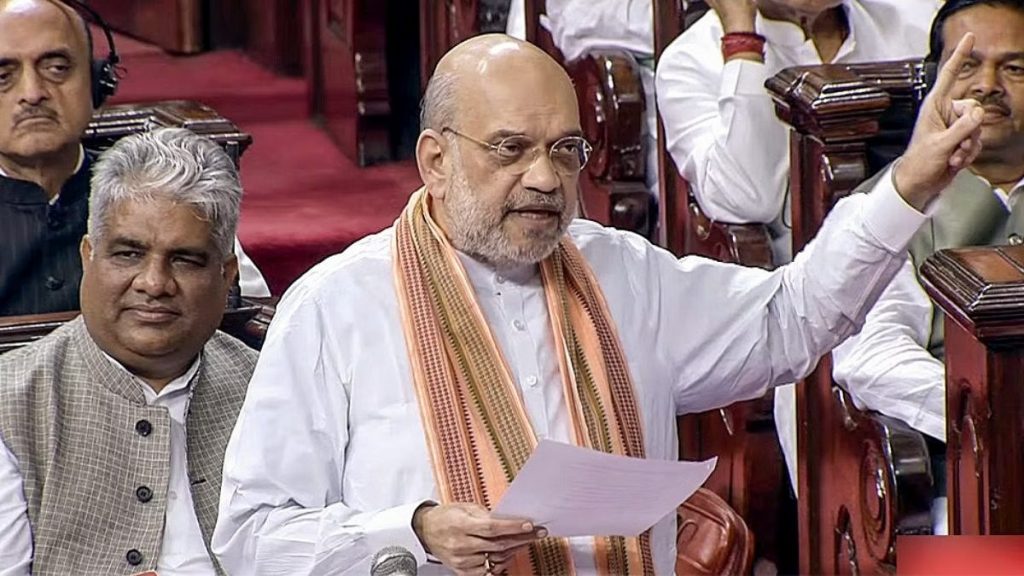New Delhi: Union Home Minister Amit Shah on Wednesday said that women empowerment was not a political issue for the BJP but an idea that is intrinsic to its work culture.
Shah made the remarks during a debate on the draft women’s reservation Bill in the Lok Sabha on Wednesday. The Bill, which proposes 33 per cent reservation for women in Lok Sabha and state assemblies, was passed with a brute majority in the Lower House on Wednesday.
जिनकी जड़ें भारत से जुड़ी हुई हैं, वे महिलाओं को कमजोर कहने की गलती नहीं करेंगे। pic.twitter.com/S1s4yCkAgl
— Amit Shah (@AmitShah) September 20, 2023
A whopping 454 members of the Lower House voted for the draft legislation on women’s reservation while 2 voted against the motion seeking the Bill’s passage.
Shah said the passage of the women’s reservation Bill will herald a new phase of “women-led development” in the country.
महिलाओं के लिए सुरक्षा, सम्मान और सहभागिता मोदी सरकार के लिए श्वास और प्राण के समान हैं। pic.twitter.com/a99MZFjQAp
— Amit Shah (@AmitShah) September 20, 2023
“This Bill would ensure women’s participation in policy-making, which had been pending for years. Women empowerment can be a political issue for many parties but it isn’t for the BJP,” Shah said, adding that it was at the core of the BJP’s working culture.
The minister said that since the formation of this government under the leadership of Prime Minister Narendra Modi, security, dignity, and participation of women have been the focus areas of the government.
Citing the ‘Jan Dhan’ accounts as examples of the push for women’s empowerment in the country, he said 70 per cent of account holders are women.
He said, “11 crore 72 lakh toilets were built across the country, in a move that went a long way into ensuring the empowerment of women.”
Shah informed the Lower House that as many as 85 MPs and 29 ministers belong to the OBC category. Prime Minister Narendra Modi also belongs to the OBC category, the Union Home Minister added.
कांग्रेस पार्टी सिर्फ राजनीति के लिए ओबीसी वर्ग की बात करती है भाजपा ने तो मोदी जी के रूप में ओबीसी वर्ग का एक मजबूत प्रधानमंत्री देश को दिया है। pic.twitter.com/57rSwVlscU
— Amit Shah (@AmitShah) September 20, 2023
The Constitution (One Hundred and Twenty-Eighth Amendment) Bill, 2023 was passed after a reply to the motion for passage by Union Law Minister Arjun Ram Meghwal.
The Bill was passed with a brute majority, as 454 members voted in favour of the legislation and two against it. The individual clauses of the draft legislation were also voted on.
Speaker Om Birla announced the eventual passage of the Bill in the Lower House.
The ‘Nari Shakti Vandan Adhiniyam’ was the first Bill passed by Lok Sabha after it shifted to the new Parliament building on Tuesday.
The Bill was passed by a majority of the total membership of the House and by a majority of not less than two-thirds of the members of the House “present and voting”.
It is a historic leap for our nation as the Lok Sabha passes the ‘Nari Shakti Vandan Adhiniyam’ today.
The bill envisaged by PM @narendramodi Ji will not only script a new chapter in the history of women’s empowerment but also foster equitable and gender-inclusive development in…
— Amit Shah (@AmitShah) September 20, 2023
The division was carried out through the distribution of slips.
Meghwal said “history” was made with the passage of the draft Bill.
Rejecting the Opposition’s criticism of the delayed implementation of provisions of the Bill, Meghwal said the draft legislation ensures transparency. The Bill was passed after a day-long debate, which was initiated by Congress leader Sonia Gandhi.
Intervening in the debate, Home Minister Amit Shah also rejected the Opposition’s contention saying the Bill will follow due procedure and the seats to be reserved will be decided by the Delimitation Commission.
मातृशक्ति के लिए संसद की एक तिहाई आरक्षित सीटों के बँटवारे में पारदर्शिता के लिए Delimitation Commission एक आवश्यक प्रक्रिया है। pic.twitter.com/fMC4YfVPc4
— Amit Shah (@AmitShah) September 20, 2023
The Constitution (One Hundred and Twenty-Eighth Amendment) Bill, 2023 is expected to be taken up by the Rajya Sabha on Thursday.
The Rajya Sabha had earlier passed the Women’s Reservation Bill in 2010, during the Congress-led UPA government. However, it was not taken up in the Lok Sabha and subsequently lapsed in the Lower House.
The government introduced the women’s quota Bill on Tuesday, with Prime Minister Narendra Modi announcing the government’s intention to bring ‘Nari Shakti Vandan Adhiniyam’.
The ongoing Special Session of the Parliament began on Monday and will continue till Friday.

